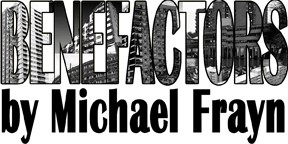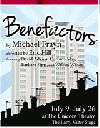Michael Frayn’s Benefactors
Skyscrapers for 1%ers at Berkshire Theatre Group
By: Charles Giuliano - Jul 13, 2014
Benefactors
By Michael Frayn
Directed by Eric Hill
Scenic design, John McDermott,; Costumes, David Murin; Lighting, Shawn E. Boyle; Composer, Scott Killian; Dialect coach, David Alan Stern; Stage Manager, Peter Durgin.
Cast: David Adkins (David), Corinna May (Jane), Barbara Sims (Jane), Walton Wilson (Colin)
The Unicorn Theatre
Berkshire Theatre Group
Stockbridge, Mass.
July 9 through July 26
Rebuilding after the Great Chicago Fire of 1871, a brilliant group of architects and engineers erected tall office buildings, or skyscrapers, in the dense business district or Loop. Initially viewed as pragmatic their sleek and innovative design spawned a dominant architectural aesthetic.
The original thinking was for commercial space. That changed when in 1949-1951 the German Bauhaus architect and refugee, Ludwig Mies van der Rohe, erected two towers at 860-880 Lake Shore Drive in Chicago. It became fashionable to live in the 26 floor, 254 ft (82 m) structures. Mies had conceived of tall minimalist glass edifices in drawings that survive at MoMA from the 1930s.
From the urban downtown business district to suburban malls, and the pariah of post war housing projects, the Bauhaus aesthetic of “less is more” or Louis Sullivan’s dictum that “form follows function” prevailed and dominated American architecture.
With scathing humor and insight it motivated social critic Thomas Wolfe’s best selling 1981 book "From Bauhaus to Our House.”
That overlaps the time frame of Michael Frayn’s insightful play “Benefactors” which opened last night, directed by Eric Hill in The Unicorn Theatre of Berkshire Theatre Group.
The play which explores the complex relationship between couples who have been neighbors and friends for twenty years has a present of 1984 looking back upon events that transpired between 1968 and 1970.
David (David Adkins) an architect is developing a ‘scheme’ to raze a perceived slum in London and transform it from a density of 30 to 200 residents per acre. The government project commission is running into all manner of social/ political opposition, site limitations, and budget constraints. Ultimately the project fails and eventually is reduced in scale and built. The outmoded neighborhood will actually be refurbished with his wife Jane (Corinna May) active in an effort which opposes his.
Frayn’s thought provoking and absorbing drama was written in 1984 but remains relevant as its issues, while controversial for their time, have accelerated. This season on Broadway, there was a similar plot line for the Idina Menzel driven musical If Then. As an idealistic city planner employed by the Evil Empire of New York City her character conflated aspects of both David and Jane. She was committed to erecting large urban developments but with people friendly parks and non invasive amenities.
Through our travels in the past dozen years from Shanghai to Berlin, New York, and London we have seen the relevance of cities gone stridently and expensively vertical. As the per square foot cost of city real estate has been driven up by unregulated speculation there has been no where to go but up.
Do you remember when Boston's South End was a multi ethic neighborhood? Not anymore. Urban removal started in Boston during the 1950s under Mayor Collins with leveling of the West End to create just the kind of housing that David is working on. Later legendary Scollay Square was razed to create the inner city wasteland of Goverment Center.
At the time, in the 1960s, an "upgrade" of historic Quincy Market was contemplated. In a classic example of reuse archutecture it was saved and now has the highest levels of visitation and per foot real estate rentals of any city in America. It proved that preserving architectural heritage can pay off for communities.
Today there are no mixed populations in the metropolis. Neighborhoods have been leveled. The poor and middle class have been evicted. There is no local small business and fewer non chain restaurants. But there is a plethora of high end bistros and fine dining for the new, upscale urban class. Most London inner city real estate is controlled by non Brits who keep a pied a terre or have speculated on real estate.
Citizens no longer own the cities they reside in. Real estate development is controlled by foreign investors whose only interest is on the bottom line.
Recently visiting Tate Modern, created in a former electric power plant then on the wrong side of the Thames, we noted a condo high rise under construction. The units were being sold at 2.5 million pounds and up.
The intense dramas of Frayn explore complex and important topics framed within human conflicts of a domestic nature.
Some years ago in London we were enthralled by his Copenhagen. During German occupation the scientist Werner Heisenberg visited his former Danish professor and friend Niels Bohr and his wife Margrethe. The 1998 play speculates on what transpired in their 1941 meeting. There has been considerable debate about the veracity of Frayn’s account.
It was an evening of intensive emotional interaction and complex sub atomic theory. A high point of the drama has Heisenberg explaining his “Uncertainty Principle” to the Bohrs in their living room.
The play was later adapted for PBS which I videotaped. Because of its combination or superb drama and theoretical physics I played it more than 20 times for my Humanities classes at Suffolk University. It was so rich and complex that I never tired of viewing it. There was always a new wrinkle to absorb.
A similar density prevails in Benefactors which exists on levels that invite multiple viewings to unravel its double helix of drama and content.
Yet again Frayn proves to be a talky playwright with very little in the way of action. Other than relentless dialogue not a lot happens until shockingly, in the second act, the beaten down, repressed house wife, Shelia (Barbara Sims) momentarily and uncharacteristically startles us by tossing a pot of scalding water into the face of her estranged bully of a husband Colin (Walton Wilson).
Through the constant back and forth of the first act which revealed the plot in agonizing increments it was a struggle to stay alert and focused. With the plot points finally in place the second act flew by like an emotional and intellectual tsunami.
The action transpires in the kitchen of David and Jane. The door is always open when the ditsy and mousey Shelia frequently drops in. When she is joined by Colin, David’s former class mate and best friend at college, following wine the neighbors are often asked to stay for dinner.
During which in Colin’s dominating presence Shelia is mute.
There is interesting staging and lighting as the four characters are also solo narrators. When it is first Shelia’s turn she proves to be more complex than we have been led to believe. Colin, who never loved her, has threatened to leave. What will become of their kids? Particularly when he quits his marginal career as a journalist and takes on being a squatter and activist vowed to bring down David’s project.
These are four not particularly endearing characters. It is easy to despise the oafish Colin who actually hates and is jealous of his “friend” David. It appears that when push comes to shove Jane hates Colin but is oddly caring and loyal bringing him food and clothing as well as shuttling his kids to visits. Shelia, of course, loves David.
Through all this David is so myopic about his project, doesn’t that define architects, that he is oblivious to the human factors engulfing him and his fragile marriage.
When Colin opts for the absurd life of an activist, Shelia and the kids move in. She works part time for David until the project tanks and he can’t afford her.
Oh yeah. Benefactors? I guess that would be David and Jane who support their troubling friends during a time of crisis. But the title is a red herring as the play is, at least for me, about the epic issue of urban design.
Just as Copenhagen was about the A Bomb and Heisenberg’s role in arguably not developing Hitler’s ultimate weapon of mass destruction. That perceived crime against humanity, a matter of whom you discuss it with, was left to us.
Had the other side won would Harry Truman have been hung as a war criminal?
This is the kind of stuff that Frayn likes to wade into. His plays leave our heads spinning sorting through the moral dilemmas.
There is a lot to like about this production with four superb and neatly balanced performances well directed by Hill. The cast gets able support from a cozy set by John McDermott and meticulous lighting by Shawn W. Boyle. The costumes by David Murin, from Shelia’s frumpy, well worn, purple Irish sweater, to David’s vintage corduroy suit seem entirely apt for the characters.
Kudos to artistic director Kate Maguire and BTG for giving us something to think about after an absorbing and challenging evening of summer theatre in the Berkshires.


